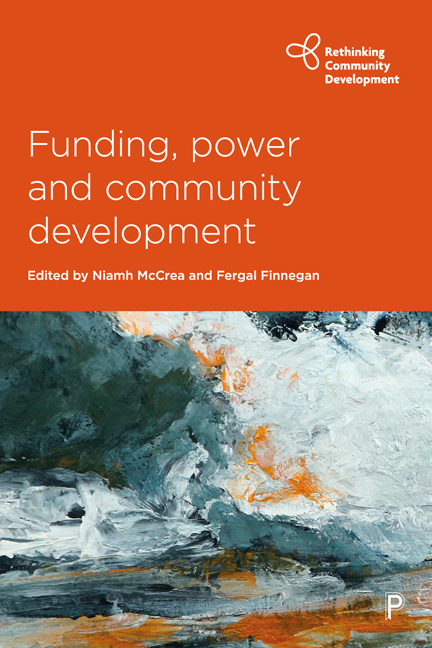Book contents
- Frontmatter
- Contents
- Series editors’ preface: Rethinking Community Development
- Acknowledgements
- Abbreviations
- Notes on contributors
- One Funding, power and community development: an introduction
- PART 1 New configurations of power and governance
- PART 2 Questions of state and grassroots democracy
- PART 3 Modes of agency and horizons of possibility
- Index
Two - Critical issues in philanthropy: power, paradox, possibility and the private foundation
Published online by Cambridge University Press: 19 April 2022
- Frontmatter
- Contents
- Series editors’ preface: Rethinking Community Development
- Acknowledgements
- Abbreviations
- Notes on contributors
- One Funding, power and community development: an introduction
- PART 1 New configurations of power and governance
- PART 2 Questions of state and grassroots democracy
- PART 3 Modes of agency and horizons of possibility
- Index
Summary
Introduction
This chapter is an attempt to take stock in a time of change: it is a reflection on what I have learnt about the politics of philanthropic funding from my community organising experience, and through empirical research and teaching. I propose that this sort of holistic, open biographical reflection is necessary in a moment of such intense political transition. It is important to discuss in a clear way how we move between theory and practice in handling ambiguities and dilemmas of funding. Given the rise of inequality and the resurgence of rightwing politics in the US and elsewhere, many scholars may refrain from critiquing liberal philanthropy. I argue that when faced with complex historical contexts it is important to remain aware of how even the most seemingly progressive philanthropic frameworks can promote commonsense narratives that reinscribe systems of power and control.
I moved to Ivanhoe, Virginia, in 1989 to live and work with Maxine Waller, a charismatic woman caught up in the struggle to save her deindustrialising coal-mining town. Alerted to the proposed sale of Ivanhoe's industrial land, Maxine, the wife of a former coal miner, launched a campaign to prevent the sale. She initially hoped that, if saved, the town might attract new industry. Raised in the culture of a company town, many miners believe that the land would be sold because they did not work hard enough, that ‘better’ workers attracted big coal to move elsewhere. Despite their original doubts, a cadre of local women joined Maxine, prevented the sale of the land, and embarked on an educational and organising campaign to plan for the redevelopment of Ivanhoe.
I was changed by this brilliant, rebellious woman and by a community that pulled together. As a participant in Ivanhoe's people's economics classes, I saw locals begin to understand the global economy and their place in the world around them, becoming active participants in planning for a future they shared. Coal miners and their wives studied and received high school diplomas, a group of women organised feminist Bible studies classes, microenterprises were formed, an oral history book was published, and local theatre productions retold the story of Ivanhoe as one of jubilee and renewal.
- Type
- Chapter
- Information
- Funding, Power and Community Development , pp. 23 - 38Publisher: Bristol University PressPrint publication year: 2019
- 1
- Cited by

